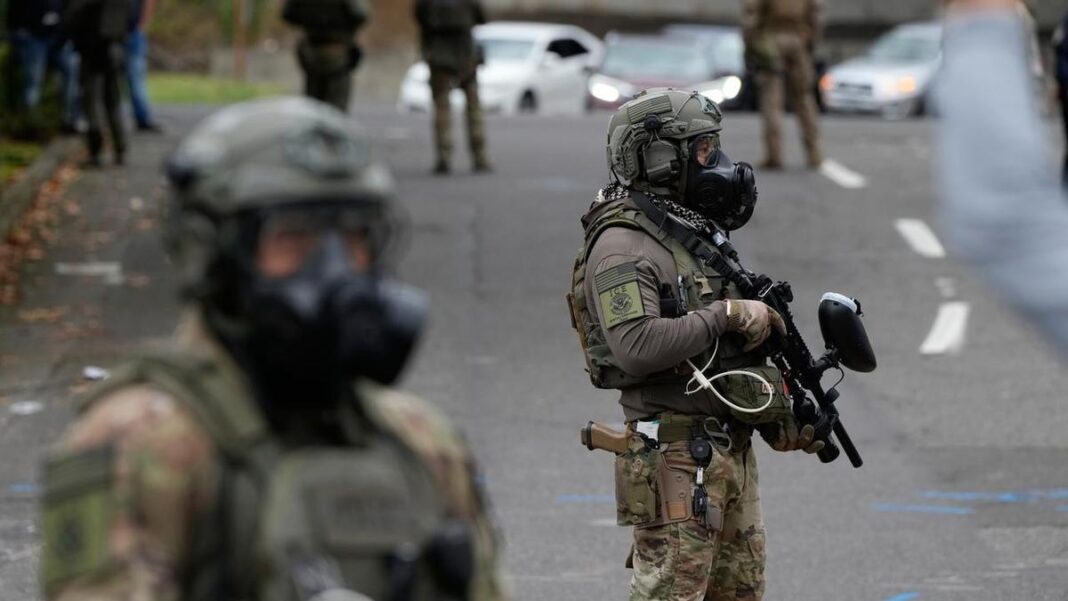The Legal Setback for Trump’s Military Deployment in American Cities
In a landmark ruling, U.S. District Judge Karin Immergut declared that President Donald Trump unlawfully ordered National Guard troops to Portland, Oregon, marking a significant legal blow to the administration’s controversial use of military force to manage civil unrest. This decision not only highlights the tensions surrounding federal intervention in state matters but also underscores the ongoing legal challenges faced by the Trump administration.
Context of the Ruling
This ruling is particularly noteworthy as it represents the first permanent judicial block against Trump’s attempts to deploy military forces to suppress protests related to immigration policies. The judge’s decision replaces a prior interim order that had temporarily halted the deployment of troops in Portland. Trump’s administration had also sought to expand this military presence into other Democrat-led cities such as Los Angeles, Chicago, and Washington D.C.
Key Details of the Ruling
Judge Immergut, appointed by Trump himself, dismissed claims by the administration that the protesters at an immigration detention facility were engaging in a rebellion that would legally justify military action. This rejection of the government’s narrative highlights a critical divide in how the events in Portland have been interpreted by different factions within the government and society.
Historical Context and Precedents
The deployment of military troops to quell domestic unrest is a controversial issue in American history, where longstanding norms typically discourage the use of armed forces against civilians. The judgment casts a shadow over Trump’s strategy, which many perceive as a radical departure from these norms. Legal experts are closely watching the implications of this ruling, as it could set a precedent for how future administrations manage civil disturbances.
Legal Challenge from the State of Oregon
The City of Portland, along with the Oregon Attorney General’s Office, filed a lawsuit in September, arguing that the Trump administration overstated the violence in the protests to rationalize its military actions. This legal battle is emblematic of a broader conflict between federal authority and state rights, a theme that has been central to political discourse in recent years.
Divergent Narratives of Unrest
During the three-day trial, contrasting stories were presented by legal representatives from both sides. The Justice Department characterized the protests as a violent siege that threatened federal agents, echoing Trump’s portrayal of Portland as “war-ravaged.” In sharp contrast, attorneys representing Oregon and Portland described incidents of violence as minimal, isolated, and effectively managed by local law enforcement.
Implications of the Ruling
This case is not just a ruling on the deployment of troops; it raises fundamental questions about the nature of governance in the United States. Portland’s attorney, Caroline Turco, articulated this dilemma, asserting, “This case is about whether we are a nation of constitutional law or martial law.” This sentiment reflects the anxieties many Americans feel regarding executive overreach and the protection of civil liberties.
Federal Charges Linked to Protests
Since the protests began in June, at least 32 individuals have faced federal charges. Among these, 11 have pleaded guilty to misdemeanors, resulting in probationary sentences, while one protester, who threw a knife at an officer, could face up to 20 years in prison. These statistics offer insight into the landscape of violence and the federal response to what were often multi-faceted protests focused on racial injustice and police reform.
Legislative Pushback Against Executive Overreach
Democratic lawmakers have criticized Trump’s actions as an abuse of military powers designed for genuine emergencies like invasions or armed rebellions. This backlash from political opponents signifies deepening divisions within the government and among the public regarding the appropriate use of military force in domestic affairs.
Ongoing Legal Developments
Following Judge Immergut’s original interim order dated October 5, the Trump administration has indicated intentions to appeal the ruling, a development that could potentially escalate to the U.S. Supreme Court. The case remains under scrutiny from the Ninth U.S. Circuit Court of Appeals, where preliminary rulings have suggested that the deployment of National Guard troops under the circumstances cited by the administration lacks legal foundation.
The ruling serves as a pivotal moment in the ongoing struggle over civil rights, governmental authority, and the actions of the Trump administration as it navigates a fraught political landscape. As the legal battles continue, the implications of this case will undoubtedly echo through future discussions on the limits of executive power and the role of law enforcement in civil society.



